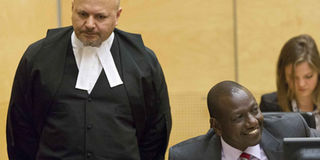Premium
Why Karim Khan stands tall among his peers in battle

Deputy President William Ruto ( R) at the International Criminal Court (ICC) in The Hague in September 10, 2013. Ruto appeared at the International Criminal Court on Tuesday for the opening of his trial on charges of co-orchestrating a post-election bloodbath five years ago. To the left is defence counsel Karim Khan. AFP PHOTO/Michael Kooren
What you need to know:
- Mr Khan leads the Deputy President’s defence team, comprising David Hooper, Shyamala Alagendra, Venkateswari Alegandra and Essa Faal.
- Mr Khan boasts a rich profile though. He specialises in international criminal law— acting on behalf of governments, heads of State, political leaders, military officers and victims before international criminal courts.
The ICC is full of prominent lawyers money can buy but Mr Karim Ahmad Khan’s confrontational style distinguishes him from his peers.
He is combative and dramatises his submissions in defence of his client, Deputy President William Ruto.
He has the propensity to make stinging remarks to tear apart the prosecution’s case as he fights to have his client cleared of charges of crimes against humanity.
“There is a rotten underbelly of this case that the prosecutor has swallowed hook, line, and sinker, indifferent to the truth, all too eager to latch on to any version, any account, any story that somehow ticks the boxes that we have to tick in relation to putting forward a summons or putting forward a confirmation hearing, completing an IDAC (in-depth analysis) chart,” he said in his opening statement in defence of Mr Ruto on Tuesday.
Mr Khan leads the Deputy President’s defence team, comprising David Hooper, Shyamala Alagendra, Venkateswari Alegandra and Essa Faal.
Of the entire team, he is the most well-known to Kenyans though. His admirers see in him an experienced lawyer who pays attention to detail while critics fault him for bringing politics into legal debates.
“He is quite astute because of the history he has in representing people in government or military. He has grown a knack for identifying the prosecution weaknesses while his work for victims also makes him bring up their issues incognito while on his defence duties,” Ol Jororok MP John Waiganjo, who is versed in international law, says.
But International Centre for Policy and Conflict chief Ndung’u Wainaina faults him for over-dramatising events, which he argues, dwells more on politics rather than law.
Mr Khan boasts a rich profile though. He specialises in international criminal law— acting on behalf of governments, heads of State, political leaders, military officers and victims before international criminal courts.
His advisory work includes acting in proceedings before the International Court of Justice and the European Court of Human Rights (ECHR), according to the profile on the Black Lawyers Directory (BLD).
The directory publishes the Black Letter Law to showcase achievements of legal experts of African, Asian, Caribbean and other ethnic minority background.
Mr Khan was called to the bar in 1992 at London’s Lincoln’s Inn and later attended Wolfson College at Oxford University for doctoral studies in law.
Among his many legal assignments include being a Senior Crown Prosecutor at the British Law Commission and from 1997-2000 served as a legal adviser to the UN International Criminal Tribunal for former Yugoslavia and International Criminal Tribunal for Rwanda.
He later acted as defence counsel before Special Courts in East Timor, Sierra Leone and Yugoslavia and Rwanda.
He is also well-versed in immigration and asylum law. In 2005, Mr Khan worked as an adviser to the Appeals Chamber of the Iraqi Special Tribunal (IST). He was also made a member of the Queen’s Counsel.
According to Mr Waiganjo, his rich profile makes him a good pick to represent Mr Ruto in his case.




